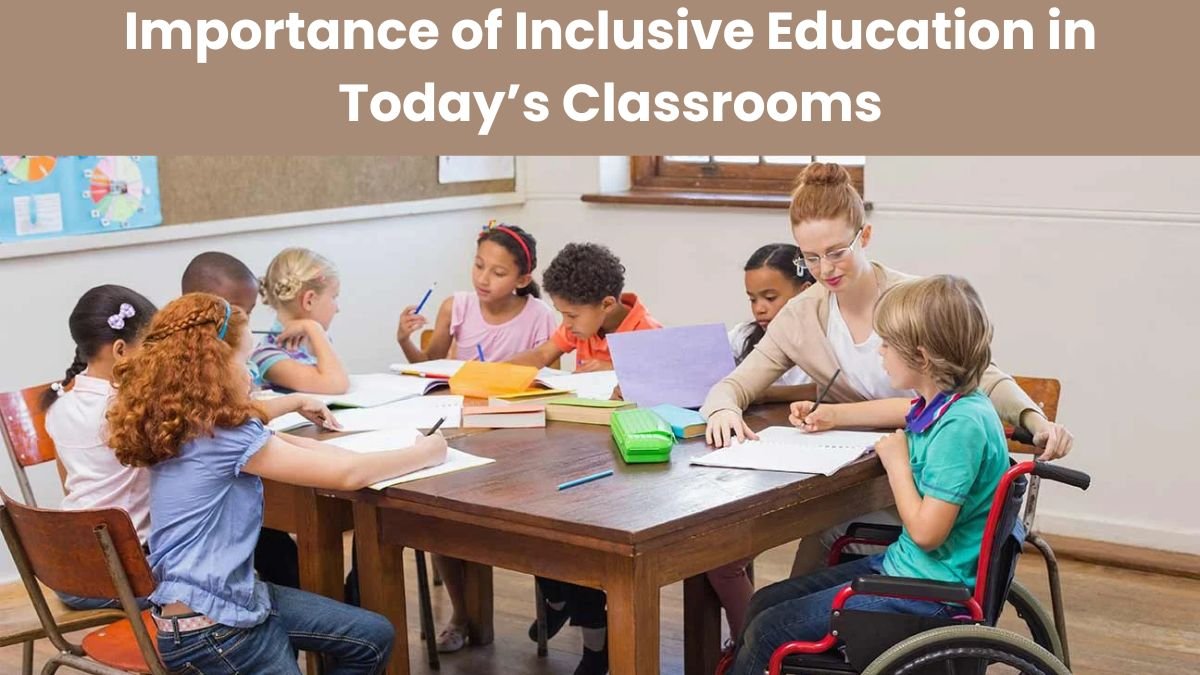Inclusive Education in the Current Classrooms: The current world is rapidly transforming and the education system should also keep up with the rapidity. Inclusive Education is even more important at a time, when people speak about diversity and equality in society. Inclusive education aims at ensuring that each of the students regardless of his social, physical or mental status has all the equal opportunities and facilities so that he can leave his mark in the world of education.
This article gives detailed information on the definition of inclusive education, its need, principles, features and challenges associated with it.
What is Inclusive Education?
Inclusive education is a kind of education where all children are granted equal access to be in a regular classroom regardless of whether he has some physical disability, problem in learning or other educational need. The general purpose of its doing is to eradicate discrimination and ensure that all students are made to feel at home.
This system of education makes sure that every school child accesses good education regardless of the diversity, ability or needs. Not only does it allow promoting academic achievements but also it helps to form such qualities as social understanding, empathy and group cooperation.
What is the reason behind inclusive education?
The issue of inclusive education is required in these times since it does not just speak about the education, but rather about equality and humanness as well.
The principal causes of this are the following ones:
- Equality: Every student, irrespective of caste, religion, class or mental state, should get equal opportunity to get education.
- Diverse Perspectives: Studying with students from different backgrounds diversifies everyone’s thoughts, which increases the ability to think and the power to find solutions.
- Social Integration: An understanding and toleration of the other students is achieved when the students of varied abilities study together.
- Better Results: Studies have found that inclusive education has advantages beyond students with special needs, but has advantages to all students.
- Real World Getting Ready: Generally, in the real life we all must collaborate with various kinds of people.
The inclusive education prepares the student to this diversity.
Doctrines of Inclusive Education: In order to make inclusive education effective, one should introduce several simple principles:
- Access and Equity: All students must enjoy equal access to education.
- Respect of Diversity: Culture, language, ability etc. of each student must be respected.
- Differentiated Instruction: The styles of the learners are different and, hence, we must leave some flexibility in the teaching.
Cooperation and Teaming Teachers, parents and the community should be able to cooperate so that they should contribute to the students growth.
- Active Participation and learning: All students are expected to take part in all the classroom activities.
- High Expectations: All the students are expected to realize his/her full potential.
- Individualised Support: The students who have a bit more need in speech special resources and support should be subject to special resources and support.
- Positive Learning Environment: It has to be a classroom in which all students feel safe, accepted and motivated.
- Assessment: The continual conclusion and criticism of the progress of students should be provided.
- Professional Development: The methods of inclusive education should be elucidated to the teachers occasionally.
Traits of Inclusive Education
- Welcoming and respecting all students.
- Equal educational opportunities for all.
- Understanding different abilities and making strategies accordingly.
- Teachers should be sensitive and competent.
- Collaborative teaching system and rich curriculum.
- Constant dialogue and involvement of parents.
Barriers to Inclusive Education
There are many barriers in the way of inclusive education which need to be identified and removed:
- Lack of resources: Lack of special equipment, teachers or technology.
- Inadequate training of teachers: Teachers are not trained to understand the methods of inclusive education.
- Negative thinking: Some teachers or parents consider special students a burden.
- Rigid curriculum: Lack of flexible curriculum is also a barrier.
- Lack of cooperation: No coordination between general and special education.
- Physical barriers: The building or class is physically inconvenient.
- Low participation of community and parents: The plan cannot be effective without their cooperation.
- Large class size: When there are too many students in the class, individual attention cannot be given.
- Conventional evaluation: This is not an appropriate evaluation of the capabilities of all pupils.
Conclusion
Inclusion education is a practice which does not only represent education, but equity, compassion and social solidarity. It allows each and every student his or her space, allows them to be unique in their own way and allows them to shine In giving every student equal consideration and the assistance they require in order to excel, we are indeed not only developing a great education system, but we are creating a society where the society is empowered, tolerant, and aware.
